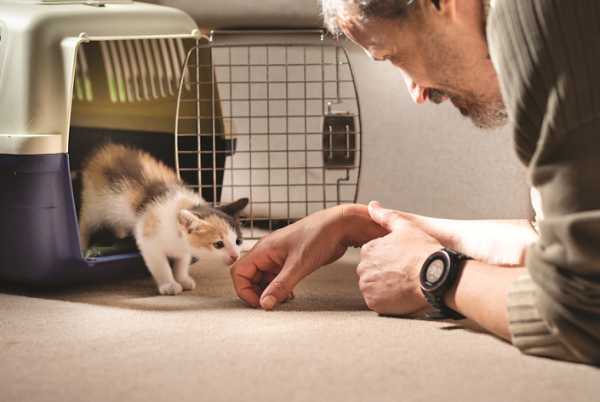Almost every day I get emails from animal shelters begging me to care for kittens until they’re old enough to go up for adoption. Shelters (the term I’m going to use for both independent rescues and municipal facilities) are desperate for foster homes to take what I call “tweans”— weaned but too young to survive in a shelter.
Gemma Smith, the administrative manager of the ASPCA Kitten Nursery New York City, says foster homes allow underage kittens to grow up protected from disease and excess stress they may face in shelters. Kitten fosters feed and socialize kittens, weighing them regularly to make sure the little furballs are on a healthy track. I know when I take these little guys, I’m a lifesaver. You can be, too.
Pick a Shelter
If you want to add hero to your resume, reach out to your city/county animal shelter about their fostering opportunities. Or, talk to an associate at your pet supply store about independent groups that hold adoption events onsite. Attending these events gives you a chance to talk to volunteers and get info.
Every shelter and rescue organization has different policies, so ask the shelter some of the following questions to see if it is a good fit for you.
- How long will I be expected to foster the kitten?
- What are the specific needs of my foster kitten? (Frequent vet trips, medicating, feeding frequency, socialization.)
- Do you cover veterinary expenses?
- Where is your vet? Where do I have to pick up medications? (If you have to drive 45 minutes every time the kitten needs shots or medicine, I can assure you, it’s a pain. Been there.)
- Will I have any say if euthanasia is necessary?
It’s likely you’ll be expected to provide day-to-day supplies as well as transportation to and from the shelter, veterinary clinic and adoption events.
Create a Resort
Gemma says, “It’s best to keep a new foster kitten separate from resident pets to give them the adequate space to grow and play safely while they adapt to their new environment.”
Louise Holton, founder and President of Alley Cat Rescue and one of the pioneers in the TNR movement in the United States, says to prepare a warm welcome for your incoming houseguest, set up an isolation room in a small bathroom or quiet cage equipped with:
- Food
- Toys
- Litter Box
- Scratcher
- Bedding
- Hiding box
Since isolation room sounds awful, consider it a kitten resort. A one- to three-week resort stay (depending on instructions from the shelter) protects your own pets from parasites and diseases the kitten may be carrying and allows the kitten a quiet place to get accustomed to the sounds and smells of your home. If you simply let him out in the house, he’s going to feel overwhelmed. He’ll hide and potty wherever he feels safe.
Dr. Cynthia Rigoni of Houston’s All Cats Veterinary Clinic plus the veterinarian for the Houston Humane Society teach him to tolerate touch by gentle neck scratches using 18-inch back scratchers.
Monitor Health
Because they’re so tiny, a minor medical issue can quickly become a full-blown emergency. Dr. Rigoni says to monitor the kitten every day. “If they’re eating, peeing, pooping and playing, they’re healthy.” Always be on the lookout for signs that your kitten feels poopy (See sidebar above). When you partner with a shelter or rescue, they usually pay the vet bills, providing you arrange clinic visits with them. Shelters have vets on staff or have arrangements with specific vets. These vets provide deep discounts, whereas out-of-network vets (to steal a term from the health-insurance industry) charge full price. If you simply take the kitten to your personal vet, you may be stuck paying the bill.

©NickyLloyd | Getty Images
Avoid Foster Failure
The essence of fostering a kitten is caring for him as if he were your own, then letting him go. Getting attached is a hazard of the gig.
Naming a pet is an intimate act and creates a deeper bond. I never name my fosters, at least not names that are meaningful to me. I call them Tabby, Callie or Spot after a physical attribute or, better yet, ask the vet tech to name them.
Sure it’s hard to say goodbye. Even after 2,500 farewells, I still shed some tears. But I know he’s going to a happy home. There will always be another kitten who needs my help. If I keep this cutie, I’ll have to look at those shelter photos and know I could have saved one of those kittens. That’s powerful incentive to let him go.
When it’s 911 time
If you notice any of these 9 symptoms, get in touch with the shelter veterinarian:
- Losing or maintaining the same weight. Kittens under 6 months old should gain 2 to 4 ounces a week, about a pound per month. If they’re not gaining weight, something’s wrong. Use a kitchen scale to weigh the kittens.
- Poor appetite. This is often the first sign a kitten is sick.
- Runny poop. Same as vomiting.
- If Fluffy vomits more than twice in 24 hours or several days in a row.
- Coughing, sneezing, goopy eyes
- Pull the skin up along the middle of the spine and release. It should snap back instantly. One second to return is too long; the kitty is dehydrated.
- Loss of coordination
- Lethargy
- Constant crying
Award-winning feline health and behavior author and past president of ‘Cat Writers Association’, Dusty Rainbolt has hand-raised over 2,500 bottle babies and tweans. Check out her books ‘Cat Scene Investigator: Solve Your Cat’s Litter Box Mystery and Finding Your Lost Cat: The Practical Cat-Specific Guide to Your Happy Reunion’. More at dustycatwriter.com.
